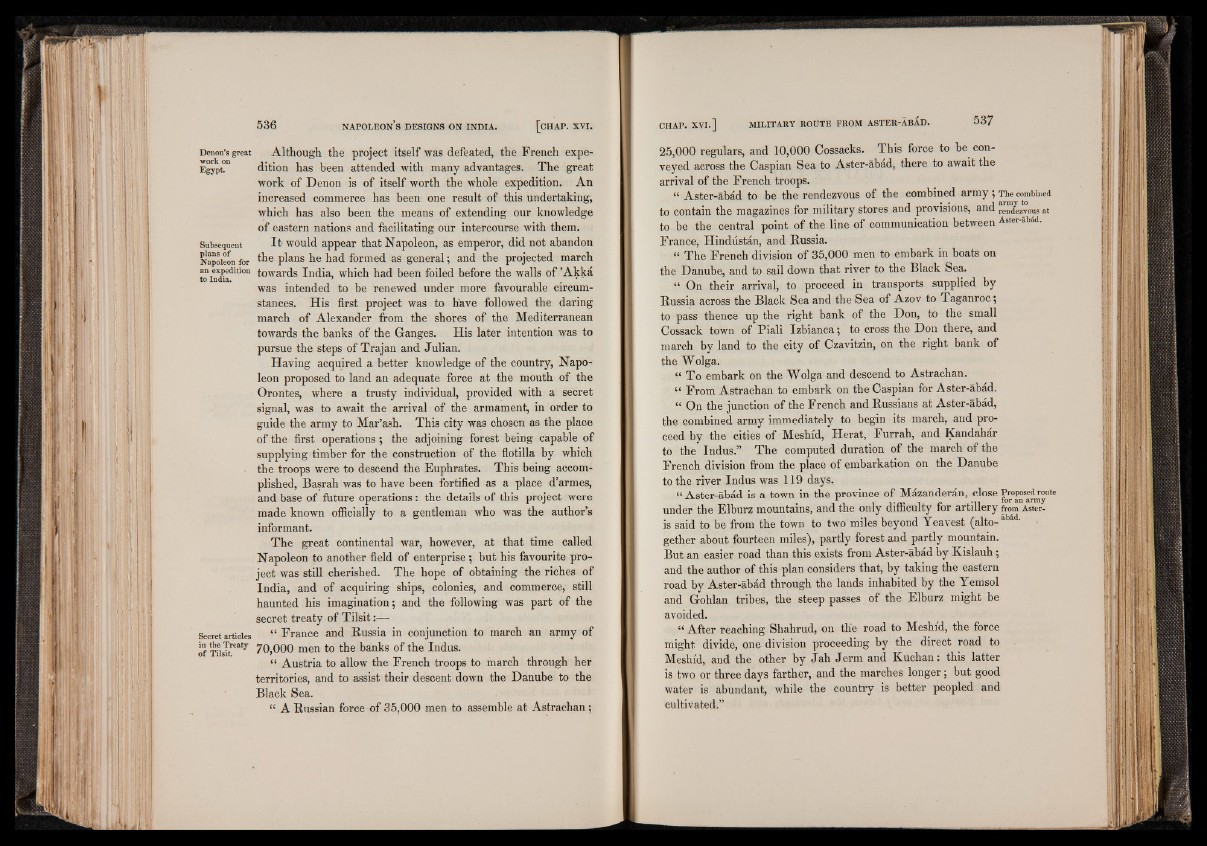
Denon's great
■work on
Egypt.
Subsequent
plans of
Napoleon for
an expedition
to India.
Secret articles
in the Treaty
of Tilsit.
Although the project itself was defeated, the French expedition
has been attended with many advantages. The great
work of Denon is of itself worth the whole expedition. An
increased commerce has been one result of this undertaking,
which has also been the means of extending our knowledge
of eastern nations and facilitating our intercourse with them.
It-would appear that Napoleon, as emperor, did not abandon
the plans he had formed as general; and the projected march
towards India, which had been foiled before the walls of ’Akka
was intended to be renewed under more favourable circumstances.
His first project was to have followed the daring
march of Alexander from the shores of the Mediterranean
towards the banks of the Ganges. His later intention was to
pursue the steps of Trajan and Julian.
Having acquired a better knowledge of the country, Napoleon
proposed to land an adequate force at the mouth of the
Orontes, where a trusty individual, provided with a secret
signal, was to await the arrival of the armament, in order to
guide the army to Mar’ash. This city was chosen as the place
of the first operations; the adjoining forest being capable of
supplying timber for the construction of the flotilla by which
the troops were to descend the Euphrates. This being accomplished,
Basrah was to have been fortified as a place d’armes,
and base of future operations: the details of this project were
made known officially to a gentleman who was the author’s
informant.
The great continental war, however, at that time called
Napoleon to another field of enterprise ; hut his favourite project
was still cherished. The hope of obtaining the riches of
India, and of acquiring ships, colonies, and commerce, still
haunted his imagination; and the following was part of the
secret treaty of Tilsit:—
“ France and Russia in conjunction to march an army of
70,000 men to the banks of the Indus.
“ Austria to allow the French troops to march through her
territories, and to assist their descent down the Danube to the
Black Sea.
“ A Russian force of 35,000 men to assemble at Astrachan;
25,000 regulars, and 10,000 Cossacks. This force to be conveyed
across the Caspian Sea to Aster-abad, there to await the
arrival of the French troops.
“ Aster-abad to be the rendezvous of the combined army; The combined
to contain the magazines for military stores and provisions, and rendezvons at
to be the central point of the line of communication between Aster-abid.
France, Hindustan, and Russia.
“ The French division of 35,000 men to embark in boats on
the Danube, and to sail down that river to the Black Sea.
“ On their arrival, to proceed in transports supplied by
Russia across the Black Sea and the Sea of Azov to Taganroc;
to pass thence up the right bank of the Don, to the small
Cossack town of Piali Izbianca; to cross the Don there, and
march by land to the city of Czavitzin, on the right bank of
the Wolga.
“ To embark on the Wolga and descend to Astrachan.
“ From Astrachan to embark on the Caspian for Aster-abad.
“ On the junction of the French and Russians at Aster-abad,
the combined army immediately to begin its march, and proceed
by the cities of Meshid, Herat, Furrah, and Kandahar
to the Indus.” The computed duration of the march of the
French division from the place of embarkation on the Danube
to the river Indus was 119 days.
“ Aster-abad is a town in the province of Mazanderan, i ,. „ . « .c..l o s e tPorro p31o1s aerdm royute
under the Elburz mountains, and the only dimculty tor artillery from Aster-
is said to be from the town to two miles beyond Yeavest (altogether
about fourteen miles), partly forest and partly mountain.
But an easier road than this exists from Aster-abad by Kislauh;
and the author of this plan considers that, by taking the eastern
road by Aster-abad through the lands inhabited by the Yemsol
and Gohlan tribes, the steep passes of the Elburz might be
avoided.
“ After reaching Shahrud, on the road to Meshid, the force
might divide, one division proceeding by the direct road to
Meshid, and the other by Jah Jerm and Kuchan: this latter
is two or three days farther, and the marches longer; but good
water is abundant, while the country is better peopled and
cultivated.”